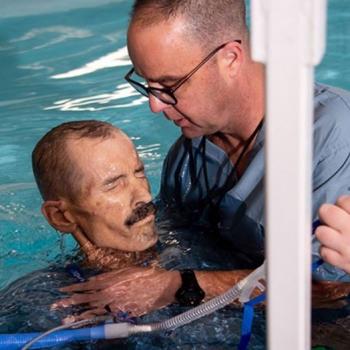
If anybody needs a primer in the power of positive thinking, look no further than Jane Brody’s recent column in the New York Times, which told the story of a World War II vet named William Richmond:
My recent column on optimism drew hundreds of comments from readers who testified to the value of living life as a glass half full. But one in particular — from a 90-year-old man living in Calabasas, Calif. — was especially telling. The reader, William Richmond, wrote that a phrase in the column, “Fake it until you make it,” summed up his long and very successful life.
In 1946, after serving nearly four years as a fighter pilot in the Marine Corps, Mr. Richmond said he returned to civilian life “certain I could conquer anything I went after.”
After all, he’d managed to fly solo and safely land a Piper Cub after just six hours of training, then spent the next year learning to be a pilot. “Do it, then learn how — I guess if it’s good enough for the Marines…,” he wrote.
Mr. Richmond loved jazz and, having been handed a drum to play in his middle school band in Rockford, Ill., he decided to go to Los Angeles to become a professional musician.
“I wasn’t very good, but I could keep pretty good time and could look like I knew what I was doing,” he wrote. “In a few months I actually got a job in a downtown bar and in due time was playing in a big band.”
But recognizing his musical limitations, he then enrolled in a music college to learn how to be a professional drummer, after which he worked almost nonstop for 15 years in big-name bands, playing for singers like Peggy Lee, Ella Fitzgerald and Frank Sinatra — and finally for Jerry Lewis.
Noting Mr. Richmond’s ability to make people laugh, Mr. Lewis asked him up to write jokes, then a movie, “The Ladies Man” (1961), which was a success even though his collaborator, Mel Brooks, quit early on, leaving Mr. Richmond, a complete novice, to write it. After taking a class in screenwriting, Mr. Richmond wrote six more movies for Mr. Lewis, and followed that with 30 years as a professional comedy writer on countless TV shows before retiring at age 73.
“The important thing,” Mr. Richmond said in an interview, “is to visualize what you want and go after it. Be ready for an opening — serendipity — all the time.”…
…In an interview, author Dr. [Elaine] Fox said: “The important thing is having a sense of control over your life, your destiny. When you have a setback, you feel you can do something about it.”
Or, as she wrote: “Optimism is not so much about feeling happy, nor necessarily a belief that everything will be fine, but about how we respond when times get tough. Optimists tend to keep going, even when it seems as if the whole world is against them.”
Sometimes a little bluffing helps. Mr. Richmond said he got his first professional break by telling other musicians he was a great drummer. One thing led to another, until he got a job with a band that was to play one-nighters on the road for nine months.
“After the first night, I was fired — I just wasn’t good enough,” he recalled. “But they had to keep me until they found a replacement, and gradually I started to play better and better, so I kept the job.”
Dr. Fox has shown that while brain circuits vary from person to person, it is possible to strengthen what she calls the “sunny” brain and weaken the “rainy” brain.
Among the science-based “retraining” methods she describes in her book are these:
¶ Face your fears head on. Step outside your comfort zone to help eliminate fear, anxiety and negative thoughts that can stand in the way of success.
¶ Re-evaluate events in your everyday life. Tell yourself that maybe things aren’t so bad.
¶ Practice mindful meditation. Allow feelings and thoughts to pass through your mind without judging or reacting to them; that helps create a sense of detachment from negative experiences.
¶ Take control over how you feel instead of letting feelings control you. A sense that you control your destiny can help you bounce back from setbacks and maximize your enjoyment of life.
¶ Laugh. Use positive feelings to counter negative ones.
¶ Be fully engaged. Get involved in activities that are meaningful to you, whether it’s a career, hobby, sport or volunteering. Do it, as Bill Richmond says. Then learn how.
There’s more at the link.











